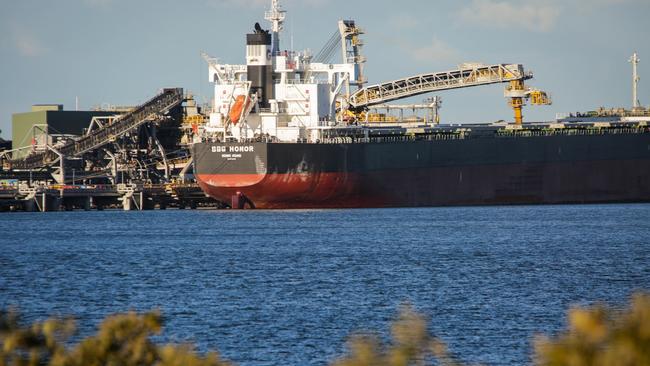Port of Newcastle offers coal exporters long-term price deal
The Port of Newcastle is trying to stitch together a long-term pricing deal with coal exporters, offering discounted rates.

The Port of Newcastle is scrambling to stitch together a long-term pricing deal with coal exporters, offering discounted rates for long-term customers ahead of a big fee hike this week as it looks to exit the cycle of regulation and litigation that has dogged its private owners.
Faced with ongoing lawsuits over its coal pricing from customers, backed by the Australian Competition & Consumer Commission, the Port of Newcastle has launched an effort to lock in long-term pricing for its major Hunter Valley coal customers.
The move comes ahead of what is likely to be renewed outrage when the privately owned port — bought for $1.75bn in 2014 by a consortium including The Infrastructure Fund and China Merchants Port Holdings — publishes its 2020 pricing this week, including a 33 per cent hike in coal charges, from 78c a tonne to $1.04 a tonne.
The lift is based on the last pricing decision of the Australian Competition Tribunal, made in October, which is currently being challenged by the ACCC in the Federal Court.
It is understood that the port will set its rate in line with that allowed by the tribunal from January 1, hitting coal producers with a 33 per cent hike as coal prices soften.
ANZ analysts said last week that benchmark prices for Newcastle coal were likely to fall further in 2020, from an average $US64 ($92) a tonne in November to as low as $US60 a tonne by June, ahead of a recovery later in the year.
It is understood the port has been offering a steep discount to the 2020 rate to customers prepared to commit to a 10-year pricing deal, in an effort to offset concerns over the looming hike.
Under the offer, charges would start at about 81c a tonne in 2020, a 28 per cent discount to the 2020 published rate, and grow at 4 per cent a year to hit $1.20 a tonne in 2030.
Documents circulated to customers by the port suggest the offer compares favourably to likely regulated rates through the 10-year contract, compared to a $1.04 starting price and inflation-based increases of 2.37 to 2.5 per cent each year through the period.
The Port of Newcastle’s strategy mirrors that of Queensland rail hauler Aurizon, which brought an end to decades of wrangling with major coal customers and regulators over rail access charges in May, locking in revenue certainty through 10-year pricing deals and getting its relationships with customers out of the courts and tribunals.
But industry sources suggest Newcastle Port’s offer may not win the widespread support gained by the Aurizon offer, as key components of the rail hauler’s offer included productivity improvements and significant concessions around maintenance and infrastructure spending and the scheduling of line outages.
Although the competition tribunal’s price determination said that a $1.04 a tonne rate was needed to incentivise further investment at the port, users say no firm offers have been made about productivity improvements through its coal terminals through the life of the proposed agreement. And, while even insiders concede the ongoing legal action by Glencore and the ACCC has only limited chances of success, the prospect of regulated rates returning to levels closer to the 78c a tonne charged in 2019 may keep some on the sidelines.
The brawling between Newcastle Port and Glencore began within a year of privatisation, when the mining major launched legal action aimed at giving competition regulators oversight of charging at the port, after fee increases after the sale.
The Port of Newcastle argued charges through its shipping channel had remained relatively static for decades under government ownership, and the fee hikes were needed to improve facilities and infrastructure after decades of underinvestment by the NSW government.
Glencore lost the first round, when the National Competition Council agreed with the port’s position, saying it had every incentive to maximise export volumes and no reason to put the squeeze on its biggest customers.
But the mining giant took the dispute to the Australian Competition Tribunal and won, and then defended the victory from challenges in the Federal Court. The disputes flared again this year with renewed vigour, when the port asked the NCC to make a new determination on the issue.


To join the conversation, please log in. Don't have an account? Register
Join the conversation, you are commenting as Logout